As Pope Francis’ trip to America wound to a conclusion on Sunday night, his thoughts turned East - and in particular towards China.
“I'd really like to go to China," he told reporters on the flight back to Rome. "I love the Chinese people."
As he flew out of US airspace American commentators were busy comparing Francis with the next world leader on the White House merry-go-round, China’s President Xi Jinping who was in Washington as Francis concluded his visit to Philadelphia’s World Meeting of Families.
“These two leaders are on exactly opposite paths: Pope Francis is a stalwart champion of human rights and witness for religious freedom while President Xi heads a regime that is one of the world's most notorious violators of human rights, including religious freedom,” a leader in the Philadelphia Inquirer opined.
"I hope there is a possibility to have good relations with China," Francis said. "We have contacts, we talk. It's necessary to keep going".
The state of relations between China and the Vatican are better than they have been in the past - in 2014 he became the first Pope to be allowed to fly through Chinese airspace - but still a long way from making a visit to China possible.
“The most controversial question to be resolved relates to the nomination of bishops, but there are also other issues to be resolved including the fundamental issue as to the level of religious freedom that the church leadership can have in mainland China,” said Gerard O’Connell, associate editor of America magazine.
The latest setback in those relations comes from the Communist Party which President Xi leads. In a move that fits with the growing anti-Western rhetoric of the Xi Jinping administration, the United Front Work Department has been charged with the "prevention" of overseas involvement in religious activity. Party members are now officially banned from following a faith as part of rules stipulating that religion must be separated from the Chinese state.
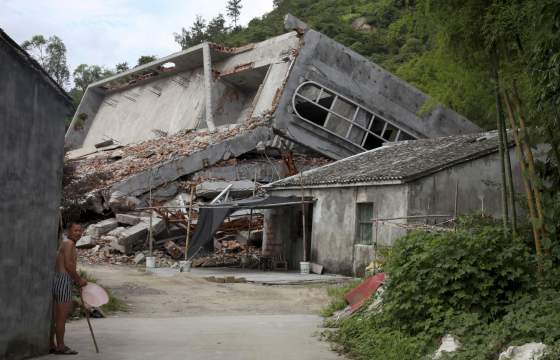 The remains of a Catholic church in eastern China's Zhejiang province razed by the authorities (PA)
The remains of a Catholic church in eastern China's Zhejiang province razed by the authorities (PA)
This clause has the potential to be a stumbling block in ongoing talks between China and the Vatican about ending China's practice of appointing bishops.
The United Front is particularly influential over religious groups because it oversees the State Administration for Religious Affairs, which in turn manages China's five recognised religions — Catholicism, Protestantism, Islam, Buddhism and Daoism.
"The new rule says it is essential for the Chinese Communist Party to unite all forces in society as China transforms itself, with reforms in almost every area," state news agency Xinhua reported.
The new regulations are a direct result of the growing nervousness within the Communist Party of the growing influence of Christianity in the north and south of Beijing, and the Islamisation of the western provinces of Xinjiang and Gansu.
Recent research carried out by the Purdue University, in Indiana, predicted that Christians will make up about 32 per cent of the population by 2040 - and a 67 per cent majority by 2050 at current growth rates.
There are estimated to be 100 million Christians in China today compared with just 8 million in 1991.
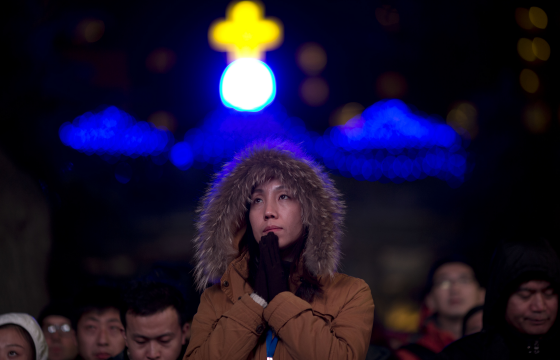 There are about 100 million Christians in China today (PA)
There are about 100 million Christians in China today (PA)
Religious rights groups say that they are witnessing China’s most severe crackdown on Christianity and Islam for years. Authorities in Zhejiang province have removed more than 1,200 crosses since the end of 2013 and demolished dozens of Catholic and Protestant churches.
Recent clashes in Zhejiang — dozens have reportedly been injured trying to protect crosses — show that a policy of building bridges with these communities is a thing of the past for Chinese authorities, said Ying Fuk-tsang, director of the Divinity School at the Chinese University of Hong Kong.
"These events are in violation of the conventional work of the United Front. It is difficult to understand," he said. “Insistence on church-state separation has rarely been mentioned for years and now it reappears in regulation.
"Religion cannot interfere with politics while the government can interfere with religion."
In Xinjiang, China's largest geographical region, Muslim Uighurs, who until recently made up most of the population, have complained that authorities have outlawed cultural and religious markers including burqas and even large beards. Beijing has maintained it is targeting a minority of Muslim separatists responsible for a recent wave of deadly bombings and stabbings in western China.
Meanwhile, state run media created a virtual news blackout of Francis’ visit to the US, while pushing blanket coverage of their leader following in his wake.
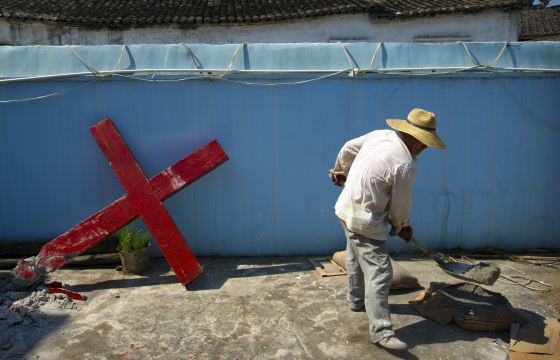 Authorities have torn down more than 1,200 crosses in Zhejiang since 2013 (PA)
Authorities have torn down more than 1,200 crosses in Zhejiang since 2013 (PA)
"If you just read the newspapers in China, you would not know the Pope is making a trip to the US," said Jason Chui, a Beijing-based journalist who works for a Hong Kong-based media agency told CNS.
One of the few references in the state-run media highlights how far China and the Vatican have to go before any visit of a Pope to its mainland is possible.
The state-run Beijing Youth Daily said on its social media account that Xi and US President Barack Obama did not discuss the Pope when they met for talks.
"It seems they did not talk about religious figures, [neither the one] coming from Europe or [the one who settled] in India."
Additional reporting by UCA News (ucanews.com) and Catholic News Service
KEEP UP TO DATE ON TWITTER...
Follow all the latest news and events from the Catholic world via The Tablet's Twitter feed @the_tablet

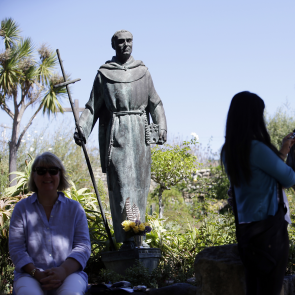
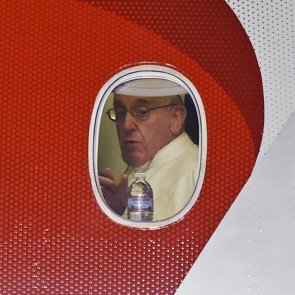

 Loading ...
Loading ...